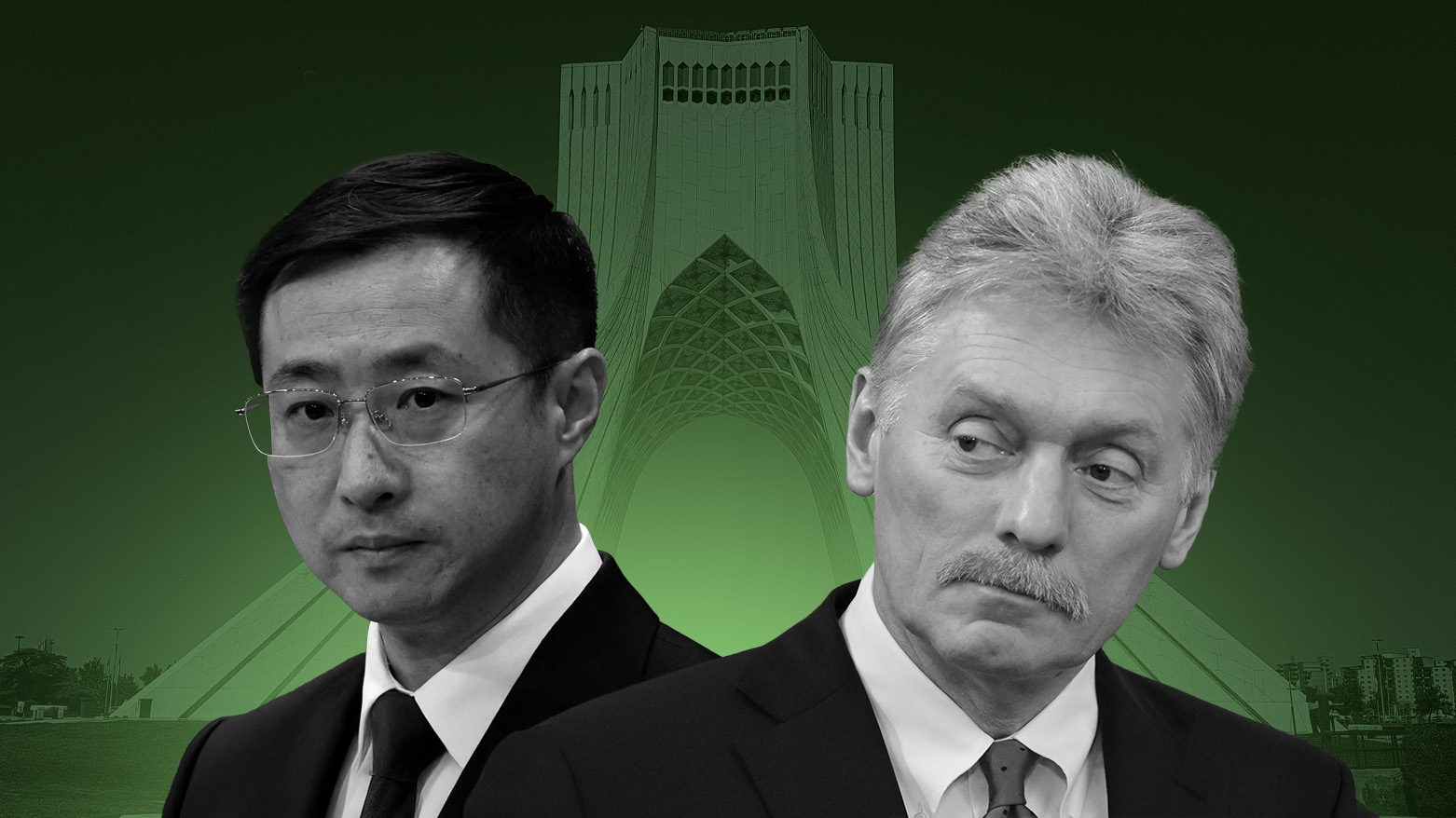Russia, China Back US-Iran Talks
Kremlin spokesperson Dmitry Peskov said that Russia “absolutely” welcomed the upcoming talks; China urged the United States to approach the talks with greater integrity and mutual respect.

By Kamaran Aziz
ERBIL (Kurdistan 24) — Russia and China have thrown their weight behind a surprise diplomatic opening between the United States and Iran, welcoming the announcement of high-level nuclear talks scheduled for Saturday in Oman.
It seems that the reactions from Moscow and Beijing reflect not only their growing alignment with Tehran but also their broader geopolitical strategy to counterbalance U.S. dominance in the Middle East.
After months of intensifying rhetoric and mounting regional tension, Iran and the United States are now poised to engage in high-level negotiations in the Sultanate of Oman, in what could become a pivotal moment for diplomacy in the Middle East. The announcement of the talks has stirred reactions across global capitals, particularly from Moscow and Beijing.
Iran’s Foreign Minister Abbas Araghchi confirmed the development via social media on Monday, writing on X: “Iran and the United States will meet in Oman on Saturday for indirect high-level talks.” He described the talks as both a “valuable opportunity” and a “test of intentions,” adding, “The ball is in America's court.”
Just hours earlier, U.S. President Donald Trump had confirmed during a joint appearance with Israeli Prime Minister Benjamin Netanyahu that preparations were underway for 'direct talks.' “Saturday’s meeting is very big,” Trump said, suggesting the talks could avert a dangerous escalation. He noted, “Doing a deal would be preferable to doing the obvious,” a remark widely interpreted as a reference to military action.
On Tuesday, Kremlin spokesperson Dmitry Peskov said that Russia “absolutely” welcomed the upcoming talks, calling them a positive step toward reducing tensions. “We know that certain contacts — direct and indirect — are planned in Oman. And, of course, this can only be welcomed because it can lead to de-escalation of tensions around Iran,” Peskov stated, as reported by AFP. Moscow has repeatedly advocated for diplomatic engagement, particularly in the face of repeated threats of military escalation from Washington.
The Russian Foreign Ministry also revealed that expert-level consultations involving Russia, China, and Iran were held in Moscow on Tuesday to coordinate positions ahead of the Oman meeting. This trilateral dialogue underscores a growing axis of strategic cooperation among the three nations, united by shared grievances against Western economic and political pressure. Meanwhile, the Russian parliament ratified a strategic partnership treaty with Iran, further deepening bilateral cooperation.
In a parallel response, China urged the United States to approach the talks with greater integrity and mutual respect. According to a report by Reuters, Chinese foreign ministry spokesperson Lin Jian accused Washington of triggering the crisis by unilaterally abandoning the nuclear agreement. “As the country that unilaterally withdrew from the comprehensive agreement on the Iran nuclear issue and caused the current situation, the U.S. should demonstrate political sincerity and mutual respect,” Lin said.
Beijing further called on Washington to abandon its policy of maximum pressure and embrace constructive diplomacy. “China will continue to maintain communication with all relevant parties, actively promote peace and dialogue, and push for a diplomatic solution at an early date,” Lin added.
Iran has confirmed its participation in the Oman meeting but emphasized that the negotiations will remain indirect. Iranian officials reiterated their position that direct engagement with Washington is “meaningless with a party that constantly threatens to resort to force.” Still, reports from The Washington Post, The Wall Street Journal, and The New York Times suggest that Iran’s Supreme Leader Ayatollah Ali Khamenei may reconsider direct talks if Saturday’s session proves productive.
The upcoming talks would be the first high-level engagement between Washington and Tehran since Trump’s return to office in January. If direct, they would also mark the first such meeting since Trump withdrew from the 2015 Joint Comprehensive Plan of Action (JCPOA) in his first term.
Trump’s renewed diplomatic push follows a letter reportedly sent to Khamenei earlier this year, combining overtures with thinly veiled threats. The U.S. is demanding that Iran dismantle its nuclear infrastructure and halt support for regional militias, or risk military retaliation. “If the talks aren’t successful with Iran,” Trump said bluntly, “Iran is gonna be in great danger.”
According to the WSJ, Iran’s nuclear stockpile is now sufficient to produce several nuclear weapons. While U.S. intelligence maintains that Khamenei has not yet ordered the construction of a bomb, fears are mounting that time is running out.
The Trump administration is reportedly seeking a broader deal than the 2015 accord, demanding the complete dismantling of Iran’s nuclear infrastructure, a permanent end to uranium enrichment, and restrictions on its ballistic missile program. Iranian leaders, however, have made clear that any new agreement must guarantee that the U.S. will not withdraw again.
Adding to Tehran’s vulnerabilities are recent Israeli airstrikes that reportedly weakened Iran’s air defense systems and missile production infrastructure. The erosion of support from proxy forces in Gaza, Lebanon, and Syria has also left the Islamic Republic more isolated than in previous years.
Despite mounting pressure, Iran has shown no sign of willingness to dismantle key nuclear facilities like Natanz and Fordow. Analysts believe such concessions remain politically and strategically implausible.
The U.S. delegation to the Oman talks will be led by Trump’s envoy Steve Witkoff, according to The New York Times. Washington has insisted that negotiations will not be open-ended, as Trump seeks to secure a major foreign policy achievement in his second term.
Whether these talks lead to a breakthrough or yet another diplomatic deadlock remains uncertain. But what is clear is that Russia and China are determined to shape the outcome, positioning themselves as champions of stability in a region teetering on the brink.
Saturday’s meeting in Oman could define the future of U.S.-Iran relations, with global and regional powers watching intently. The world waits to see whether diplomacy can avert disaster—or if confrontation is once again inevitable.